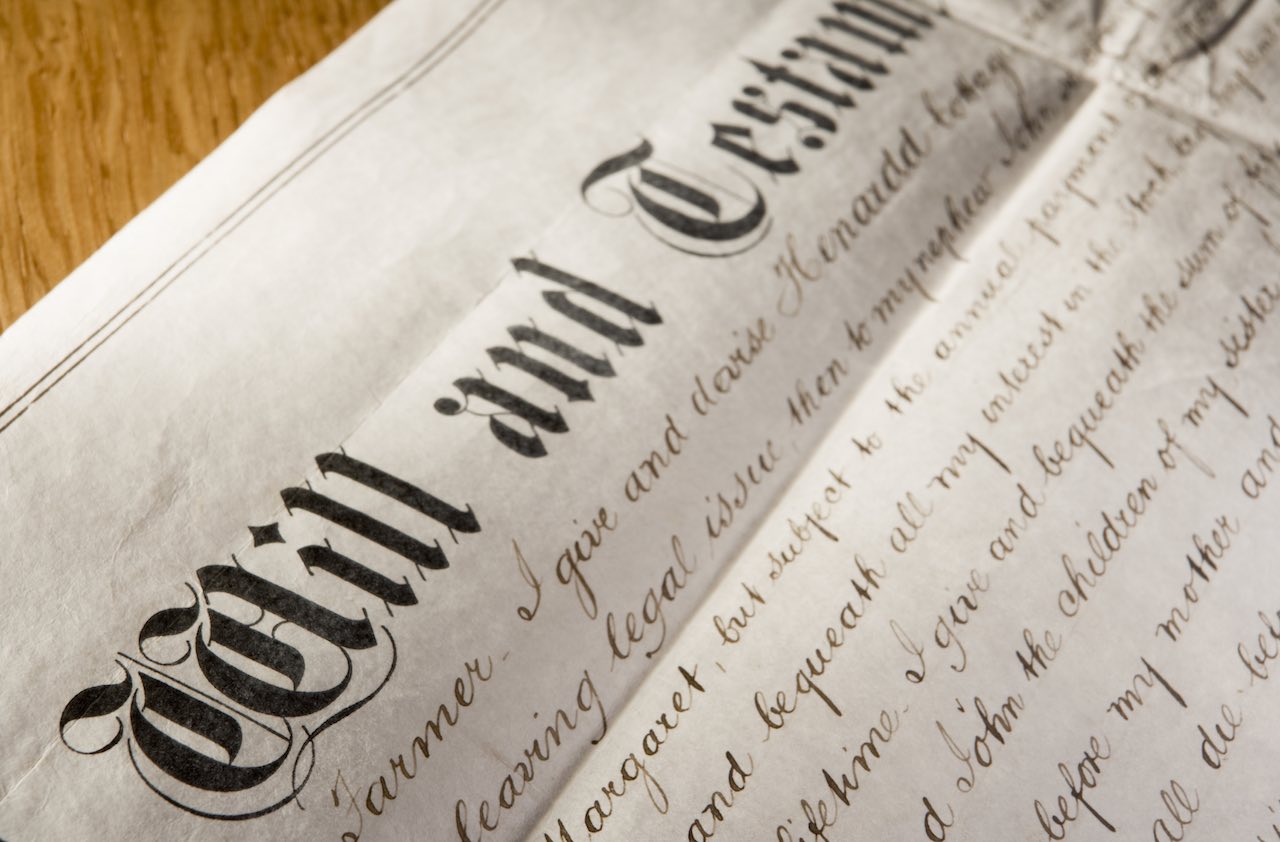7 Good Reasons to Change Your Will
Life is ever-changing, and so are your estate-planning needs. Here are seven situations in which you'll want to reevaluate your will.

Profit and prosper with the best of Kiplinger's advice on investing, taxes, retirement, personal finance and much more. Delivered daily. Enter your email in the box and click Sign Me Up.
You are now subscribed
Your newsletter sign-up was successful
Want to add more newsletters?

Delivered daily
Kiplinger Today
Profit and prosper with the best of Kiplinger's advice on investing, taxes, retirement, personal finance and much more delivered daily. Smart money moves start here.

Sent five days a week
Kiplinger A Step Ahead
Get practical help to make better financial decisions in your everyday life, from spending to savings on top deals.

Delivered daily
Kiplinger Closing Bell
Get today's biggest financial and investing headlines delivered to your inbox every day the U.S. stock market is open.

Sent twice a week
Kiplinger Adviser Intel
Financial pros across the country share best practices and fresh tactics to preserve and grow your wealth.

Delivered weekly
Kiplinger Tax Tips
Trim your federal and state tax bills with practical tax-planning and tax-cutting strategies.

Sent twice a week
Kiplinger Retirement Tips
Your twice-a-week guide to planning and enjoying a financially secure and richly rewarding retirement

Sent bimonthly.
Kiplinger Adviser Angle
Insights for advisers, wealth managers and other financial professionals.

Sent twice a week
Kiplinger Investing Weekly
Your twice-a-week roundup of promising stocks, funds, companies and industries you should consider, ones you should avoid, and why.

Sent weekly for six weeks
Kiplinger Invest for Retirement
Your step-by-step six-part series on how to invest for retirement, from devising a successful strategy to exactly which investments to choose.
After you've created your will and an estate plan, you'll most likely need to revisit them at key points in your life as your circumstances change.
1. You Get Married
Your new spouse doesn't automatically become your chief heir. Most states give a spouse one-third or one-half of an estate. If you don't have any children, your parents or siblings would get the rest. To leave all your property to your spouse, you'll need a will. You cannot disinherit a spouse without his or her consent.
If you are living with someone but are not married and you want your significant other to inherit any of your property, you need a will.
From just $107.88 $24.99 for Kiplinger Personal Finance
Become a smarter, better informed investor. Subscribe from just $107.88 $24.99, plus get up to 4 Special Issues

Sign up for Kiplinger’s Free Newsletters
Profit and prosper with the best of expert advice on investing, taxes, retirement, personal finance and more - straight to your e-mail.
Profit and prosper with the best of expert advice - straight to your e-mail.
2. You Become a Parent
Obviously, the big question is how your children will be cared for if both you and your spouse die. Now you definitely need a will to name a guardian for your children, and you may want to also name a property manager to handle their inheritance while they are still minors.
Or consider using trusts to handle assets that would go to your children. Also execute a durable power of attorney naming your spouse or someone else to act for you in financial matters when you can't. Durable power remains effective even if you become mentally unable to handle your own affairs.
3. You Approach Middle Age
Your assets are growing, so tax planning could save your heirs thousands in federal estate taxes. The time to act is when you and your spouse have a combined net worth, including house, retirement plans, and insurance proceeds, that approaches the amount vulnerable to the federal estate tax ($10.9 million for couples in 2016, $5.45 million for singles). You can give an unlimited amount to your spouse tax-free, by designating it in your will or by owning all assets jointly, for example.
State estate taxes, imposed by 14 states and the District of Columbia, can also be an issue, although less so as states raise the amount that is exempt from estate taxes so wealthy retirees won't decamp to another state.
Update your will to reflect family births, deaths, separations, or divorces. Review guardian, trustee, and personal-representative appointments. Reevaluate the nature of specific gifts to people or groups. And recalculate how much life insurance you need.
4. You Get Divorced
Review absolutely everything. The people in your life are changing. So must your estate plan. You need a new will altogether because in most states a divorce automatically revokes the provisions of a will that apply to a former spouse. In some states a divorce revokes the entire will.
You'll want to set up trusts to control the assets you plan to leave your children. And revise any living trusts to remove your former spouse as a beneficiary or trustee. Do likewise with a durable power of attorney or a living will. Plus, unless restricted by a divorce decree, change the beneficiaries on your life insurance, pensions, and IRA.
5. You Remarry
You and your new spouse may have to plan for families from prior marriages and for children you have together. Consider a prenuptial agreement, should you want to keep assets separate and nullify your inheritance rights to each other's estates.
You'll want to provide for your new spouse and still be certain your children are taken care of. To do this, talk to an estate-planning lawyer about a qualified terminable interest property trust -- QTIP, for short. This trust can be set up in a will to give your spouse the income from the trust property and some rights to principal. But when he or she dies, the assets go to beneficiaries you have chosen.
6. You Retire or Move to Another State
If you retire to another state (or any time you move to a new state, for that matter), have your estate-planning documents reviewed in light of that state's laws and your current needs.
Durable powers of attorney become even more important. For example, if you are stricken with Alzheimer's disease, you may become unable to give the required consent for financial transactions. Life insurance coverage may not be needed anymore. But if your estate faces an estate-tax liability or if your spouse is dependent on retirement income that will end with your death, consider keeping the coverage.
7. Your Spouse Dies
This loss can leave you emotionally vulnerable to financial mistakes. For at least several months, avoid selling your house or making other drastic changes.
Seek expert advice. There may be tax benefits to disclaiming some of your inheritance in favor of alternate beneficiaries, such as your children, if your spouse's estate is subject to the federal estate tax and you have enough assets of your own, including liquid assets.
You'll need to get a new will and, if needed, a revocable living trust. Execute a new durable power of attorney and a living will (which expresses your wishes in case of an illness that leaves you permanently incapacitated). Put these in a safe place, and tell people who need to know where they are.
Profit and prosper with the best of Kiplinger's advice on investing, taxes, retirement, personal finance and much more. Delivered daily. Enter your email in the box and click Sign Me Up.
-
 Ask the Tax Editor: Federal Income Tax Deductions
Ask the Tax Editor: Federal Income Tax DeductionsAsk the Editor In this week's Ask the Editor Q&A, Joy Taylor answers questions on federal income tax deductions
-
 States With No-Fault Car Insurance Laws (and How No-Fault Car Insurance Works)
States With No-Fault Car Insurance Laws (and How No-Fault Car Insurance Works)A breakdown of the confusing rules around no-fault car insurance in every state where it exists.
-
 7 Frugal Habits to Keep Even When You're Rich
7 Frugal Habits to Keep Even When You're RichSome frugal habits are worth it, no matter what tax bracket you're in.
-
 What DOGE is Doing Now
What DOGE is Doing NowThe Kiplinger Letter As Musk's DOGE pursues its ambitious agenda, uncertainty and legal challenges are mounting — causing frustration for Trump.
-
 COVID Hospitalization Rates See an Uptick As Winter Looms — The Kiplinger Letter
COVID Hospitalization Rates See an Uptick As Winter Looms — The Kiplinger LetterThe Kiplinger Letter A new Omicron booster is available, but the elderly are still at risk and winter is right around the corner.
-
 Will Weight-Loss Drugs Spike Medicare Costs?: The Kiplinger Letter
Will Weight-Loss Drugs Spike Medicare Costs?: The Kiplinger LetterEconomic Forecasts Lawmakers are trying to get weight-loss drugs like Wegovy covered by Medicare. Long-term savings are possible, but it could cost the program $27 billion.
-
 Greenland, U.S. Plans to Boost Tourist Economy: Kiplinger Economic Forecasts
Greenland, U.S. Plans to Boost Tourist Economy: Kiplinger Economic ForecastsEconomic Forecasts A U.S. congressional effort could see some Canadian visitors get longer stays, meanwhile, Greenland bids to be the next vacation hotspot.
-
 Medicare Drug Price Negotiations Latest: Kiplinger Economic Forecasts
Medicare Drug Price Negotiations Latest: Kiplinger Economic ForecastsEconomic Forecasts Medicare drug price negotiations: Early signs have emerged of how these key talks will be handled.
-
 Forces That Affect Your Estate Plan
Forces That Affect Your Estate Planretirement From probate and ownership division to the taxing arm of Uncle Sam, here are four things that can influence what happens to your belongings.
-
 Tapping Your IRA in Retirement
Tapping Your IRA in Retirementretirement You can cash in your IRA all at once, but doing so could subject you to an enormous tax bill. You'll probably do better tax-wise by taking out as little as necessary each year.
-
 Make a Plan for Your Retirement Savings
Make a Plan for Your Retirement Savingsretirement The first step to effectively using your 401(k) is to assess your retirement needs.